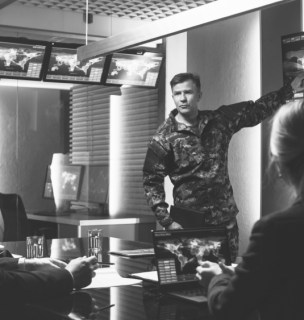
What is a MPA Strategic Studies and Cybersecurity?
A MPA in Strategic Studies and Cybersecurity is a specializedpostgraduate level 7 programme designed to expand knowledgeand skills in the matters related to cyberthreats, cyberdefence,and the technical, legal, political approaches to protect thecyber-systems, as they are part of a comprehensive strategy developed by the state actors, corporations and the civilsocieties organizations.
The reasons that can motivate for MPA Strategic Studies and Cybersecurity?
Nowadays cyberattacks are among the most common actionsundertaken in a situation of conflict. This is becoming part of thehybrid strategies, in a situation of conflict and of course of armedconflict. Studying Cybersecurity and Cyberdefence is necessaryto update the perception we can have of the defence andsecurity policies. It is also helpful to know how private and statecybersystems can be protected from attacks.
The courses provided by a MPA Strategic Studies and Cybersecurity
This program is taught in English but specific sessions can be providedin French in particular conditions
SPECIALIZED COURSES
Actors, Geopolitics and Governance of the Cyberspace
The course understands the birth of the cyber era from the convergenceof advanced computing power and the global interconnection ofcomputer networks, creating a unified space for data storage and flow.
Examine the roles and influences of different entities, includingcompanies, states, and civil society, in cyberspace.
Explore how synergy and cooperation between defense, industrialdevelopment, and research allow states to redefine their roles in the
international order, formulating public policies for cyber governance.
Study national and international regulations governing cyberspace,focusing on maintaining a healthy and secure environment.
Principles and Mechanisms of Cybersecurity
Traces the evolution of data security, emphasizing how moderntechnologies and the internet have heightened the need for robustinformation system protection.
Teaches the fundamental principles of cybersecurity aimed atsafeguarding data and information systems against cyber threats thatcould affect their availability, integrity, or confidentiality.:
Identifies the components of cyber-attacks, including the attacker,objectives, targets, and procedures, and understand their variedconsequences.
Understands cryptographic methods for converting readable data intoencrypted formats, ensuring that only authorized entities with thecorrect decryption key can access the information.
Cyber-defence: Policies, Strategy and Tactic
Develops a doctrine and organizational structure for effective cyberdefense.:
Examines how cyber activities challenge traditional concepts of borders,territory, and security, reshaping notions of attack, enemy, and defense.
Recognizes cyberspace as the fifth dimension of strategic operations,alongside land, sea, air, and outer space. Can cyber-deterrence beconceived?
Understands the role of cyber-capabilities in supporting conventionalmilitary forces.
Foreseeing Cyber-risks in Information Technologies and OperationalTechnologies
The purpose is to enable the student to
plan and organize components within an infrastructure, focusing onintegrating security elements. Implement cyber design principles tocreate secure systems.
master the systematic process of identifying, analyzing, and evaluatingpotential risks that an organization, project, or system may face.
conduct penetration tests (Pen Testing) to simulate attacks and identifyvulnerabilities in computer systems or networks, aiming to enhanceoverall security.
Implement recommendations to strengthen the security of IT and OTsystems by addressing identified vulnerabilities.
Cyber Intelligence:
Transition from searching for moving information to stored data,understanding the shift from passive to active information gathering in adata-rich environment.
Utilize intelligence for cyberdefense purposes, focusing on the collectionand analysis of information to protect against cyber threats.
Learn to collect information from publicly accessible digital sources forintelligence purposes:
Use artificial intelligence to analyze vast amounts of information toachieve a better understanding and better analyze situations in real time.
FUNDAMENTAL WORKSHOPS
Workshop in Strategic Studies
The purposes of the workshop are summarized as follows:
Enabling the student to exploit and use the knowledge provided in thefundamental courses in Cyberdefence , Cybersecurity andCyberintelligence in addition to the teachings of the general strategycourses
Making the link between Cyberdefence and the existing defence strategies and practice of the armed conflicts
Applying the concepts and doctrine to specific areas of conflicts andcrises adapted to the concerns of the students.
Developing a synthetic approach and a critical thinking through theresearch papers and presentations required
Workshop in Research Methodology
The workshop is dedicated to the scientific research processes in thesocial sciences, in international relations, diplomacy and in strategy. Itpresents the methods used in the development of hypotheses and in theuse of information or observation data. It specifically addresses themethod of writing the dissertation itself.
FUNDAMENTAL COURSES
Decision-Making and Strategy in Armed Conflicts
The course provides an updated presentation of the contemporaryarmed conflicts, and how they moved away from the old conventionalwarfare and are affected by a new combination of inter and intrastatearmed conflict, like hybrid warfare. In addition, the technological shift inwarfare with the robotization of war and the introduction of artificialintelligence are also considered.
The strategy-operational planning-tactic chain depends on a decision-making process with at its core the political decision makers, theirprerogatives, their doctrines, and the way they decide. This is a key issueto be learnt in strategic studies.
Geopolitics and Geostrategy of the Great Powers
The very nature of an international/or/global political system relies onthe balance of force between the leading global powers. As the worldsystem moved from a bipolar system to a unipolar, then to the presentsystem qualified a multipolar by some and as non-polar by others, thecourse emphasizes a presentation of:
the capabilities of each of the great powers, in addition to the politicalstructure and dynamics
the foreign policies in their changing doctrines and strategies for eachof the considered powers
their influence on the global geostrategic landscape
Geopolitics of the Sea and Maritime Strategies
The control of the sea seems to be one of the key issues as far as thenational economies are dependent on foreign trade and shipments andcommodities, on international movements of population and on theaccess to strategic locations.
The course combines a historical approach starting with thedevelopment of political geography and the emergence of sear powers,with an updated presentation of the key present issues at stake,stressing out the type of control exerted by each of the planetary andregional powers.
Each of those powers has its own maritime strategy to control the keylocation in the seas, oceans and straights, or at least to balance theexpansion and the hegemonic strategy of competing or antagonisticpowers.
The objectives of the MPA Strategic Studies and Cybersecurity

Develops the appropriate knowledge and skills to integrate thecyberthreat dimension in the management of strategies, publicaffairs and international relations

Provides auditors with access to an extensive network of recognized experts
The course of the year of the MPA Strategic Studies and Cybersecurity
The program runs for one year. The courses are adapted to the professional constraints of executives in terms of time volume and schedule.
The lessons are programmed on a weekly basis for four months, giving priority to two afternoons (Thursday and Friday, 4.15-8:30 p.m.) as much as possible, and spreading some courses over three intensive weeks
The next intake is expected for late November 2024


The research thesis of the MPA Strategic Studies and Cybersecurity
TThe student completes the program with the presentation and defense of a MPA thesis under the supervision of a CEDS professor. The research thesis is the essential step in the training program, insofar as it allows the student to study in-depth a topic related to a problematic in contemporary strategyor in security issues that is related to the dynamics and evolutionof the cyberspace.
Prerequisites to apply for the MPA Strategic Studies and Cybersecurity
A Master 1 level degree is required, as well as four years of executive professional experience


Access requirements for the MPA Strategic Studies and Cybersecurity
To enter the program, the auditor must complete an application.
The skills and opportunities offfered by a MPA Strategic Studies and Cybersecurity.
Attending the whole programme provides the student with theknowledge and skills that are necessary to be in charge of acybersecurity mission or department, in government administrations as well as in private companies and ininternational organizations.
This enables those who are not destinated for cybersecuritymissions to have an appropriate knowledge to understand thetransformation of the present geostrategic landscape andchallenges.

Tuition fees for the MPA Strategic Studies and Cybersecurity
| Nationals and Residents | International candidates |
|---|---|
| 10400€ | 10890€ |
Practical information about the MPA Strategic Studies and Cybersecurity
Support for a successful curriculum
Once enrolled, the auditors receive pedagogical documents and information.
They have the opportunity to get in touch with the professors and experts and to interact with them.
They also have the possibility to choose the research topic that is the most suitable to their concerns, areas of interest or professional ambitions, within the limits of the specialization they are enrolled for.
A supervisor is appointed since the middle of the year to guide them and provide the appropriate methodological advises

Stakeholders
Our lecturers or experts in their field.

Campus
Classes are held at :
10 Sextius Michel
75015 Paris
France

Accessibility
The premises are accessible to people with disabilities.








